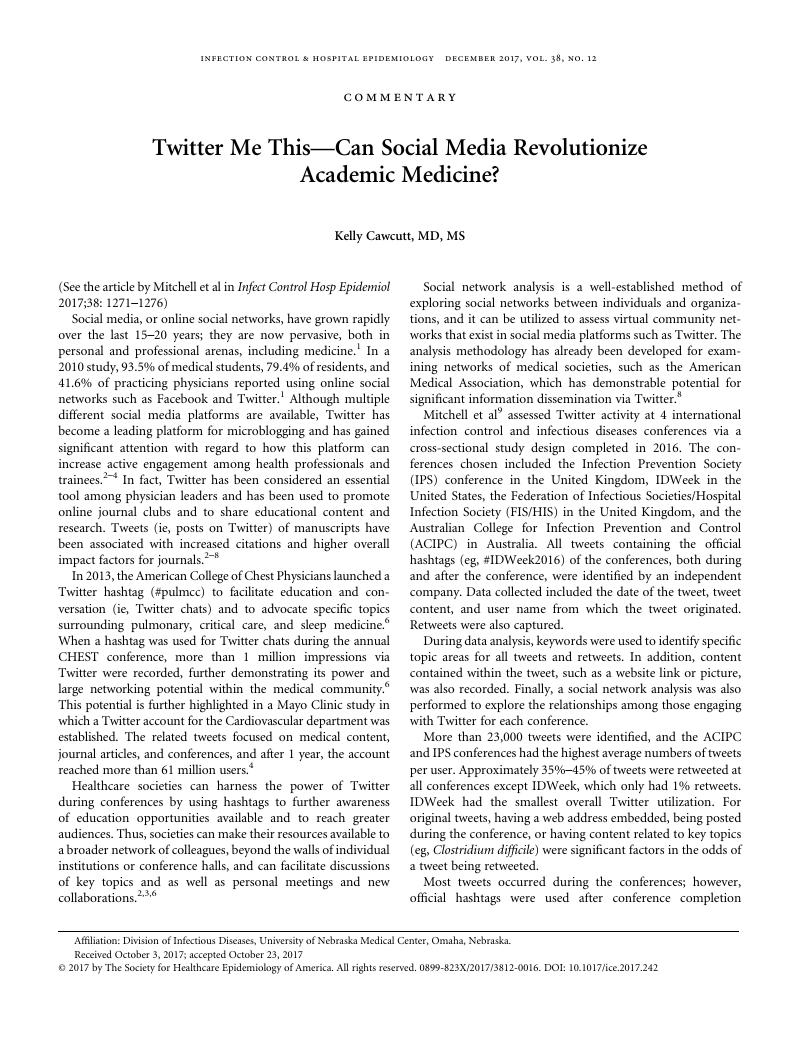Crossref Citations
This article has been cited by the following publications. This list is generated based on data provided by Crossref.
Malina, Debra
Shillcutt, Sasha K.
and
Silver, Julie K.
2018.
Social Media and Advancement of Women Physicians.
New England Journal of Medicine,
Vol. 378,
Issue. 24,
p.
2342.
Cawcutt, Kelly A.
Marcelin, Jasmine R.
and
Silver, Julie K.
2019.
Using social media to disseminate research in infection prevention, hospital epidemiology, and antimicrobial stewardship.
Infection Control & Hospital Epidemiology,
Vol. 40,
Issue. 11,
p.
1262.
Venuturupalli, R. Swamy
Sufka, Paul
and
Bhana, Suleman
2019.
Digital Medicine in Rheumatology.
Rheumatic Disease Clinics of North America,
Vol. 45,
Issue. 1,
p.
113.
Chandrasekar, Thenappan
Goldberg, Hanan
Klaassen, Zachary
Wallis, Christopher J.D.
Leong, Joon Yau
Liem, Spencer
Teplitsky, Seth
Noorani, Rodrigo
and
Loeb, Stacy
2020.
Twitter and academic Urology in the United States and Canada: a comprehensive assessment of the Twitterverse in 2019.
BJU International,
Vol. 125,
Issue. 1,
p.
173.
Corsini, Erin M.
Boeck, Marissa
Hughes, Kathryn A.
Logghe, Heather J.
Pitt, Susan C.
Stamp, Nikki
and
Antonoff, Mara B.
2020.
Global Impact of Social Media on Women in Surgery.
The American Surgeon™,
Vol. 86,
Issue. 2,
p.
152.
Reynolds, Staci
and
Boyd, Shelby
2021.
Healthcare worker's perspectives on use of memes as an implementation strategy in infection prevention: An exploratory descriptive analysis.
American Journal of Infection Control,
Vol. 49,
Issue. 7,
p.
969.
Harrell, Kevin N.
Vervoort, Dominique
Luc, Jessica G.Y.
Tracy, Brett M.
and
Daniel Stanley, John
2021.
Social Media in Surgery.
The American Surgeon™,
Vol. 87,
Issue. 7,
p.
1021.
Kanmounye, Ulrick Sidney
2022.
Commentary: Step-by-Step Guide on How to Make a 2-Dimensional Operative Neurosurgical Video: Microsurgical Resection of Right Lateral Ventricle Subependymoma by an Anterior Interhemispheric Transcallosal Approach.
Operative Neurosurgery,
Vol. 22,
Issue. 3,
p.
e120.
Kanmounye, Ulrick Sidney
Dutton, John L.
Naidu, Priyanka
Msokera, Chifundo
Collier, Zachary J.
Fernanda Tapia, Maria
Mikhail, Shady
Xepoleas, Meredith
Auslander, Allyn
Yao, Caroline A.
and
Magee, William
2022.
Cleft Lip and Palate Research in Low- and Middle-income Countries: A Scientometric Analysis.
Plastic and Reconstructive Surgery - Global Open,
Vol. 10,
Issue. 2,
p.
e4122.
Istl, Alexandra C.
Verma, Subhrata
Jawa, Natasha A.
Mackin, Robin
Seemann, Natashia M.
and
Kirpalani, Amrit
2023.
Across the Twitter-verse: Is Twitter an equitable tool in academic medicine? A scoping review.
Advances in Health Sciences Education,
Vol. 28,
Issue. 3,
p.
997.
Aron, David C.
2023.
An Insider’s Guide to Academic Medicine.
p.
115.
Stevens, Carly R.
Merk, Katie
Ierulli, Victoria K.
and
Mulcahey, Mary K.
2023.
Analysis of Social Media Posts That Promote Women Surgeons.
Journal of Surgical Education,
Vol. 80,
Issue. 5,
p.
682.



